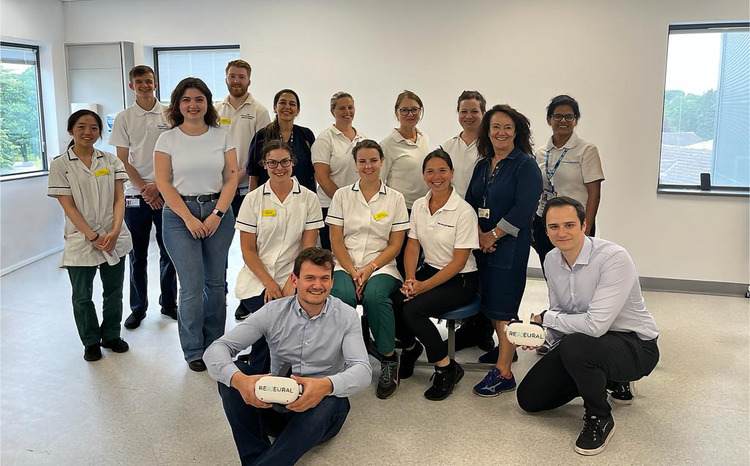Digital Health Coffee Time Briefing 
- 27 March 2024

Your morning summary of digital health news, information and events to know about if you want to be “in the know”.
???? News
???? Black Country Healthcare NHS Foundation Trust (BCHFT) has successfully integrated the use of AI mental health app Wysa across schools in Walsall, Dudley, Wolverhampton, and Sandwell. The initiative has already benefitted 562 individuals aged 11+, offering them crucial support outside traditional care hours. Designed to complement the trust’s commitment to the I-Thrive model of accessible support, Wysa provides 24/7 digital tools tailored to each user’s needs. These tools, which include psychoeducational materials and self-care resources, aim to prevent the escalation of mental health symptoms, offering a bridge of support to those awaiting or post-treatment. The importance of this digital intervention is highlighted by the data revealing that a third of young people experience symptoms of depression or anxiety, with many reluctant to seek professional help. Wysa, being clinically validated and recommended by ORCHA for reducing anxiety and depression, presents a discreet and engaging platform for young individuals to manage their mental wellbeing.
???? IgniteData, a global leader in the fast accurate transfer of regulatory-grade data between electronic healthcare records and study databases, has received £500,000 from Innovate UK Smart Grants to fund a transformative clinical research data project. The initiative will focus on providing hospitals and trial sponsors with streamlined access to unstructured healthcare data, delivering efficiencies, reducing costs and improving patient care. The Innovate UK funding will enable IgniteData to build on existing work addressing the challenges around unstructured data (such as diagnoses, clinical procedures and free text notes) and the role of AI in enhancing data accessibility for clinical studies.
???? A blood test which could help thousands of people receive earlier, more targeted, lung cancer treatments is being trialled by the NHS. The circulating tumour DNA (ctDNA) test, which will be offered to 10,000 patients by next March, can identify genetic variants in a tumour through a simple blood sample. Patients that receive CT scan results showing suspected lung cancer will have a small blood sample sent to a genomic laboratory for ctDNA testing, with results returned in around 14 days.
???? NHS Providers has launched a comprehensive guide for NHS trust board members to tackle health inequalities, warning that failure to act urgently on these disparities will put overstretched health and care services under even more pressure. Reducing health inequalities is a practical resource designed to help NHS trust board members drive down unjust differences in health outcomes in their local communities. As healthcare providers navigate the complexities of delivering equitable care within their organisations, this guide can serve as a roadmap, enabling them to champion health equity and create positive change. The guide covers a wide range of topics, from operational and clinical service delivery to the role of NHS trusts as anchor institutions and employers of NHS staff. It also provides a vision of what effective action on health inequalities entails and suggests objectives for board members to implement within their trusts.
???? Quibim, a global company pioneering imaging biomarkers for precision medicine, is today announcing the launch of a new product, QP-Liver, which improves the diagnosis of diffuse liver diseases through highly accurate quantification of tissue fat and iron from MRI scans. It has been given a CE and UKCA mark for the European Union and United Kingdom respectively, meaning it is cleared to be used in those markets.

Public satisfaction with the NHS has fallen to the lowest level ever recorded, according to analysis of the latest British Social Attitudes survey published today by The King’s Fund and the Nuffield Trust. For the first time in the 41-year history of the survey, less than a quarter of people are satisfied with the way the NHS is running. Satisfaction had previously peaked in 2010, when 7 out of 10 people reported being satisfied with the health service.
Overall public satisfaction with how the NHS runs now stands at 24% – a fall of 5 percentage points from the previous year. Since 2020, satisfaction has fallen by 29 percentage points. Dissatisfaction is also at an all-time high, with more than half (52%) of respondents saying they were dissatisfied with the NHS. The survey, carried out by the National Centre for Social Research in September and October 2023, is seen as a gold-standard measure of public attitudes in Britain.
???? What we’re reading
Generative AI is advancing rapidly and has the potential to greatly improve many aspects of society, including health. The risks of potentially harmful consequences, however, necessitate effective oversight and mitigation measures. A recent article from the BMJ highlights distinct forms of health-related risks of generative AI, with corresponding options for mitigating risk.
???? Upcoming events
27 March, online – Next steps for obesity policy, prevention and care in England




